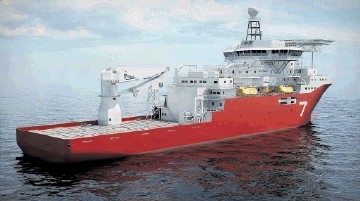
Subsea 7 is to consider giving all Norwegian Continental Shelf employees sickness pay following social dumping criticism – but the company’s managing director has warned that Norwegian wage levels for everyone will affect competitiveness.
Trade union Industri Energi’s shop steward Leif Sande had accused Subsea 7 of social dumping – where personnel are hired from a sister company in Singapore to work on the Norwegian Continental Shelf, but for lower pay and excluding overtime and paid sick leave.
After previously being frugal with its comments to the allegations, the company has now spoken out about Industri Energi’s claims.
“I don’t recognise Industri Energi’s descriptions,” said managing director Stuart Fitzgerald. “How we treat our employees has been wrongly portrayed.
“We have state of the art ships and good working conditions. Our international staff is well paid. Moreover, most of them live in countries where costs are not as high as in Norway.”
He points out that Subsea 7 adheres to the International Transport Workers’ Federation’s North European rates for offshore vessels. At the same time, Mr Fitzgerald stresses that Norwegians working for Subsea 7 in Norway are to have Norwegian contracts – which follow the Oil Service Agreement.
“We became aware of that three Norwegians worked for our international staffing company in Singapore, but they now have Norwegian contracts. This happened following the attention the matter has received.”
Mr Fitzgerald explains that Subsea 7 has vessels operating worldwide, and that can be in a country one day, in another the next.
“They then come to Norway for a few weeks before travelling on to other countries. I don’t regard these not following Norwegian collective agreements as social dumping. For me, social dumping is about exploitation of labour, which we don’t do.”
Subsea 7 not just having employees on international contracts, but also around 300 Norwegians who adhere to the Norwegian collective agreement, is because the company wants a mix of people, elucidates Mr Fitzgerald.
“It’s important for us to have many Norwegians [in the company], and we have hired 75 in the past two years. So we don’t avoid hiring people on Norwegian contracts.
Norwegian newspaper Aftenbladet, which has seen the day-rate contracts Subsea 7 offers some of their employees through their staffing agency in Singapore, said these show they do not get paid if they have to work more than a 12-hour shift, neither do they get paid if they should be ill.
“Employees on long-term contracts receive sick pay. Those who are on day-rate contracts only get this when they are offshore, not otherwise. It’s not illegal, but something we’ll consider changing.”
“Overtime is not calculated in the same way under international contracts as it is in Norway. Our employees don’t normally work for more than 12 hours before starting on a new shift again. They receive regular wages for any applicable extra days aboard without any overtime excess. The contracts are missing a formulation with a provision for should a shift last a few hours extra, but we’re going to look into that, even though we follow the ITF Agreement.”
The Subsea 7 managing director thinks it is wrong that Industri Energi chooses to single them out rather than going after the entire industry.
“It’ll affect our competitiveness if we’re the only company obliged to introduce a collective agreement for everyone who works on the Norwegian Continental Shelf. We’ll lose the opportunity to compete on an equal footing with the other companies. We’ll always follow the rules and accept it. However, we disagree that it’s the right way to go.”